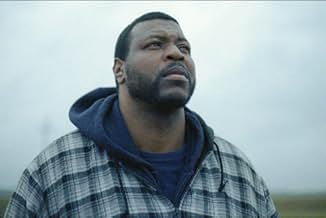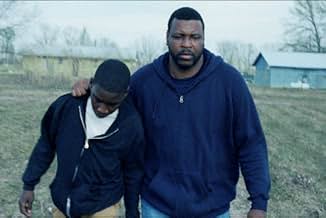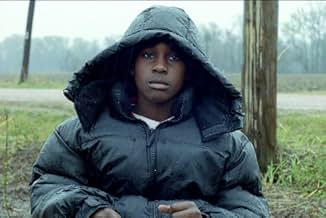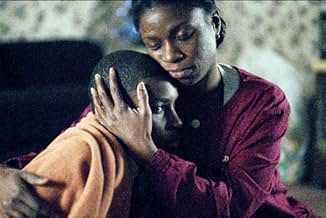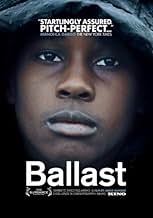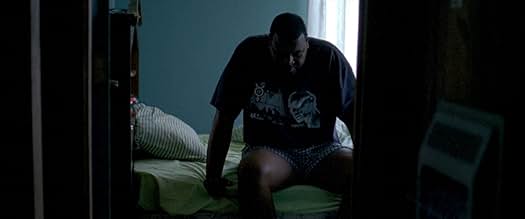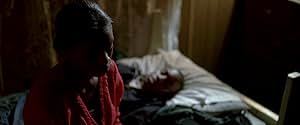IMDb RATING
6.9/10
2.5K
YOUR RATING
A drama set in the Mississippi delta, where one man's suicide affects three people's lives.A drama set in the Mississippi delta, where one man's suicide affects three people's lives.A drama set in the Mississippi delta, where one man's suicide affects three people's lives.
- Awards
- 17 wins & 21 nominations total
Neil Pettigrew
- Dispatcher
- (voice)
Sanjib Shrestha
- Dr. Shrestha
- (as Dr. Sanjib Shrestha)
- Director
- Writer
- All cast & crew
- Production, box office & more at IMDbPro
Featured reviews
I first became interested in Ballast when I heard about its setting: it's very rare to find a film set in the Mississippi Delta. It's also quite rare to find a serious drama with mostly black characters. I was afraid that this would either be a sappy melodrama or an attempt to make some "profound" point about how racism exists and is, like, bad and stuff. Thus I was quite pleased to find that this film manages to have a uniquely Southern setting without resorting to clichés or caricatures and that making some grand social statement is evidently the last thing on the mind of first time director Lance Hammer. Instead, we have a deliberately paced character study with a nicely handled mise en scene.
The film opens with the attempted suicide of Lawrence, a shopkeeper distressed over the (extremely) recent death of his twin brother/partner/only friend. Lawrence's recovery is complicated by his brother's will which indicates that the recently deceased man's ex-wife and teenage son are entitled to his share of the store and part of the property the brothers had co-habitated. Things start off tense due to the boy's involvement with some disreputable older boys that he owes money and stay that way due to Lawrence's troubled partnership with the boy's mother. This is a quiet, contemplative film for the most part and it offers no easy resolutions. Instead, it manages to realistically capture some unique characters in a woefully ignored section of American society.
The film opens with the attempted suicide of Lawrence, a shopkeeper distressed over the (extremely) recent death of his twin brother/partner/only friend. Lawrence's recovery is complicated by his brother's will which indicates that the recently deceased man's ex-wife and teenage son are entitled to his share of the store and part of the property the brothers had co-habitated. Things start off tense due to the boy's involvement with some disreputable older boys that he owes money and stay that way due to Lawrence's troubled partnership with the boy's mother. This is a quiet, contemplative film for the most part and it offers no easy resolutions. Instead, it manages to realistically capture some unique characters in a woefully ignored section of American society.
10ephes3
A movie about life after suicide can be very hard to depict, Ballast brings out the reality of life after suicide and the consequences of those actions. Filming in the South was excellent. The realness of what can happen after suicide was depicted in James' character. So many kids who loose a parent (especially a father) turn to the rough side of life. Marlee and Lawrence's characters were so real. Both of them should be commended for their acting skills. This is a must see film. The entire cast was very good. Lance Hammer did an excellent job in writing, directing, and producing this film.I was wondering if this was written from true accounts? The plot is so real to what is happening today, especially in the south. James and Lawrence's characters were very believable. Using local non-professional actors was risky, but all of them did an awesome job. There is so much talent in the south. Kudos to the entire cast including those who spoke only by body language.I hope this film wins lots of awards. I hope to see more of Lance Hammer's work.
If I want to spend a few hours out of my day to get to a cinema and spend my money to watch a film, any film, then I want it to be worthwhile. Believe me, Ballast I would have paid for twice, it's that good. And I'll be buying the DVD too.
During the Glasgow Film Festival this year, this (to us) obscure, indie film played at a multiplex and my husband - who actually met the director at the London Film Festival - urged me to see it. Why? Because I'm also a filmmaker, so I share with the director, Lance, the desire to eschew the commercial imperative when it comes to telling straight stories.
Lance, if you read this - I adored this film. It's everything - flaws and all - that I want to see on screen. The integrity of the cast, no matter where you found them, the screen craft - the photography, script, design, sound, edit, costume, makeup - or judicious lack of - all fell into place. It's what they say about making films - so many get made, but so seldom do the planets align to make a beautiful one. This to me is the bomb. I love it.
I wish you every success in your future projects.
May Miles Thomas, Elemental Films, UK
During the Glasgow Film Festival this year, this (to us) obscure, indie film played at a multiplex and my husband - who actually met the director at the London Film Festival - urged me to see it. Why? Because I'm also a filmmaker, so I share with the director, Lance, the desire to eschew the commercial imperative when it comes to telling straight stories.
Lance, if you read this - I adored this film. It's everything - flaws and all - that I want to see on screen. The integrity of the cast, no matter where you found them, the screen craft - the photography, script, design, sound, edit, costume, makeup - or judicious lack of - all fell into place. It's what they say about making films - so many get made, but so seldom do the planets align to make a beautiful one. This to me is the bomb. I love it.
I wish you every success in your future projects.
May Miles Thomas, Elemental Films, UK
We saw this at Sundance 2008, and found it to be deliberately slow, but also quite thoughtful as it told the story of a man whose twin brother's suicide devastates him. The story extends to the dead man's ex wife and son and explores the aftermath of the suicide and its effects on these three characters. What makes this film impressive is that the actors involved in almost every role had never acted before. The director revealed to us at the Q&A session that he had gone to churches in the Mississippi Delta and recruited people to be in his film. Also notable is the sound, or lack thereof. Instead of a busy, noisy soundtrack, this was a quiet film with very little music, relying instead on the ambient noise of the area in which it was filmed. We enjoyed the film and wish the director and the actors much success.
First-time LA-based director Lance Hammer's powerful, naturalistic film seeks to capture what he sees as the prevailing sadness of the Mississippi Delta landscape through its concentrated portrait of a little black family torn by terrible grief and gradually struggling from despair to reconciliation and hope. Ballast begins with a shaky camera shot of a flock of birds flying away across a plain in the Mississippi Delta, then to violent events too fast to grasp completely. A white man, John (Johnny McPhail), comes to the door of a little house to ask Lawrence (Micheal J. Smith Sr.) what's wrong. He won't speak, goes outdoors and a shot rings out. He's shot himself. John calls 911 and Lawrence is rushed to the hospital. For a while this almost looks like an episode of "Cops." The hand-held camera throws the viewer in the heart of all this action with a palpable documentary-style intimacy.
Things cool down a bit as the camera moves over to the house nearby on the same lot where a mother, Marlee (Tara Riggs), lives with her teenage son James (JimMyron Ross). Marlee works in a lousy job cleaning latrines. James is on break from school and pays visits to young drug dealers he owes money to. Rudderless and confused about his dead father, a recent suicide and Lawrence's twin, who never visited him, James turns to desperate and risky behavior that he tries to hide from his mother. The drug dealers pay a threatening visit to James's house.
Back from the hospital Lawrence remains so paralyzed by grief over his brother's suicide perishables are going bad in his little convenience store and he can barely speak, let alone reopen the store and resume normal life. Marlee gets fired from her job and there's no money. James wanders the fields, his only friend perhaps the family dog, the half-wolf Juno. Slowly, the three let out their grievances and begin reconciliation and a solution that involves the property the twins' late father left them and an uneasy cooperation between Lawrence and Marlee.
Hammer's film-making, which got him consideration at the Berlinale and two top prizes for directing and cinematography at Sundance in early 2008, involves a strong camera and meticulous natural sound (with no music), but above all the director's own commitment to humanistic integrity. His various models include Mike Leigh, Charles Burnett, and the Dardennes--Leigh for the attention to family conflicts, Burnett for truth about African-American life, the Dardennes for a method in which the camera literally dogs the footsteps of ordinary people in crisis.
This isn't digital but 35 mm. Technicolor in widescreen, by Lol Crawley, edited by Hammer. Dolby Digital sound designed by Kent Sparling of George Lucas' Skywalker Sound and edited by Julia Shirar (who's worked with Sofia Coppola and Noah Baumbach) was designed by Sam Watson, a Mississippi native, all with close, committed involvement in the project.
Essential to Hammer's approach was to use local people in the main roles and a screenplay whose dialogue was frequently rewritten by the actors who embellished their scenes with improvisation. Even when James' dialogue at some points is nearly inaudible, the sound crew kept that. Though this may be a dubious nod to authenticity, the film is so involving that it hardly leaves the viewer time to think. If this is the Dardennes, it is the Belgian brothers working in top form--save for the ending, which is no resolution or even a question mark, just an abrupt blackout. However, the whole second half of the film is a struggle toward resolution that gives a surprise sense of hope slowly emerging out of what middle-class viewers in particular might tend to see as an utterly hopeless situation.
Seen as part of the San Francisco International Film Festival 2008. To be distributed by IFC Films in late August 2008.
Things cool down a bit as the camera moves over to the house nearby on the same lot where a mother, Marlee (Tara Riggs), lives with her teenage son James (JimMyron Ross). Marlee works in a lousy job cleaning latrines. James is on break from school and pays visits to young drug dealers he owes money to. Rudderless and confused about his dead father, a recent suicide and Lawrence's twin, who never visited him, James turns to desperate and risky behavior that he tries to hide from his mother. The drug dealers pay a threatening visit to James's house.
Back from the hospital Lawrence remains so paralyzed by grief over his brother's suicide perishables are going bad in his little convenience store and he can barely speak, let alone reopen the store and resume normal life. Marlee gets fired from her job and there's no money. James wanders the fields, his only friend perhaps the family dog, the half-wolf Juno. Slowly, the three let out their grievances and begin reconciliation and a solution that involves the property the twins' late father left them and an uneasy cooperation between Lawrence and Marlee.
Hammer's film-making, which got him consideration at the Berlinale and two top prizes for directing and cinematography at Sundance in early 2008, involves a strong camera and meticulous natural sound (with no music), but above all the director's own commitment to humanistic integrity. His various models include Mike Leigh, Charles Burnett, and the Dardennes--Leigh for the attention to family conflicts, Burnett for truth about African-American life, the Dardennes for a method in which the camera literally dogs the footsteps of ordinary people in crisis.
This isn't digital but 35 mm. Technicolor in widescreen, by Lol Crawley, edited by Hammer. Dolby Digital sound designed by Kent Sparling of George Lucas' Skywalker Sound and edited by Julia Shirar (who's worked with Sofia Coppola and Noah Baumbach) was designed by Sam Watson, a Mississippi native, all with close, committed involvement in the project.
Essential to Hammer's approach was to use local people in the main roles and a screenplay whose dialogue was frequently rewritten by the actors who embellished their scenes with improvisation. Even when James' dialogue at some points is nearly inaudible, the sound crew kept that. Though this may be a dubious nod to authenticity, the film is so involving that it hardly leaves the viewer time to think. If this is the Dardennes, it is the Belgian brothers working in top form--save for the ending, which is no resolution or even a question mark, just an abrupt blackout. However, the whole second half of the film is a struggle toward resolution that gives a surprise sense of hope slowly emerging out of what middle-class viewers in particular might tend to see as an utterly hopeless situation.
Seen as part of the San Francisco International Film Festival 2008. To be distributed by IFC Films in late August 2008.
Did you know
- TriviaMicheal J. Smith Sr. (who plays Lawrence) had to be persuaded to make the film as he had no interest in such things. In real life, he works for the Public Services Commission in Yazoo City, Mississippi and was discovered attending his local church.
- ConnectionsReferenced in Film Junk Podcast: Episode 245: Fantastic Mr. Fox (2009)
- SoundtracksI'll Wait For Jesus
Traditional
Arranged by Clora T. Handy & Ann Nichols
Performed by The Canton Gospel Chorus
Courtesy of Talk of the Town Records
Details
Box office
- Budget
- $700,000 (estimated)
- Gross US & Canada
- $77,556
- Opening weekend US & Canada
- $8,572
- Oct 5, 2008
- Gross worldwide
- $81,864
- Runtime
- 1h 36m(96 min)
- Color
- Sound mix
- Aspect ratio
- 2.35 : 1
Contribute to this page
Suggest an edit or add missing content


